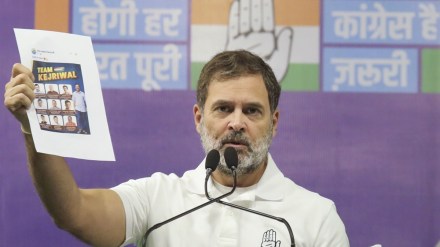As campaigning for the Delhi Assembly elections reaches its final day, tensions are rising between Congress leader Rahul Gandhi and Delhi Chief Minister Arvind Kejriwal. Gandhi’s sharp criticism of Kejriwal and the counterattacks from Kejriwal’s Aam Aadmi Party (AAP) are expected to create complications in the relationship between the two parties within the INDIA alliance after the elections.
Gandhi’s personal attacks on Kejriwal are driven by a strategy to help Congress reclaim ground in Delhi, where the party dominated from 1998 to 2013 but has since struggled to remain relevant. With Congress now focused on targeting AAP, it appears the party leadership has finally aligned with this approach.
During his initial campaign rally in Delhi on January 14, Gandhi targeted AAP’s government, but in the second phase of his campaign, he escalated his criticism. Gandhi has specifically equated Kejriwal with Prime Minister Narendra Modi, suggesting they represent two sides of the same coin.
Congress members argue that while the BJP has a stable vote share in Delhi, which ranges from 32% to 38% in Assembly elections, AAP has largely absorbed Congress’s traditional voter base. They emphasise that Congress cannot afford to align with AAP and must focus on regaining its lost supporters, according to The Indian Express.
“We have limited appeal among the BJP’s voter base, and that’s unlikely to change. We need to win back the support that has shifted to AAP,” a senior Congress leader said.
The AAP’s recent attacks on Gandhi, including a campaign poster depicting him alongside other politicians accused of dishonesty, has further angered the Congress leadership. In response, Gandhi has accused AAP of being corrupt, and he has also criticised the party for being “anti-Dalit” and “anti-reservation.” Gandhi pointed out that AAP’s leadership lacks representation from marginalised communities.
In contrast to the BJP, which has long been a known adversary for Congress in Delhi, Congress sees AAP as a more immediate threat to its future. “We can only return to power if we remove AAP from the equation,” said one Congress leader.
Internal surveys from Congress reportedly show the party’s candidates are in strong contention in at least six constituencies, and its overall vote share could rise significantly, potentially reaching double digits from its current 4.63%. Despite some missteps in earlier elections in states like Madhya Pradesh, Chhattisgarh, and Maharashtra, Congress believes its focus on AAP is grounded in solid feedback from the ground, reports IE.
The rivalry between Congress and AAP is deeply personal, stemming from the fact that AAP has managed to oust Congress from power in Delhi and Punjab. Gandhi and many in the Congress party blame the 2011 Anna Hazare movement, in which Kejriwal played a key role, for triggering the party’s nationwide decline after its 2014 defeat.
In the 2013 Delhi Assembly elections, the AAP’s rise signaled the start of a broader trend of regional parties displacing Congress in several states. This included the rise of the Telugu Desam Party in Andhra Pradesh and the Telangana Rashtra Samithi (now Bharat Rashtra Samithi) in Telangana, both of which ousted Congress from power in 2014. The Shiromani Akali Dal’s victory in Punjab in 2007 also marked a similar shift.
In the 2024 Lok Sabha elections, when Congress and AAP briefly formed an alliance, Gandhi publicly revealed he would vote for AAP’s candidate in New Delhi, while Kejriwal would vote for the Congress nominee in Chandni Chowk. Despite this, the two leaders never campaigned together.
